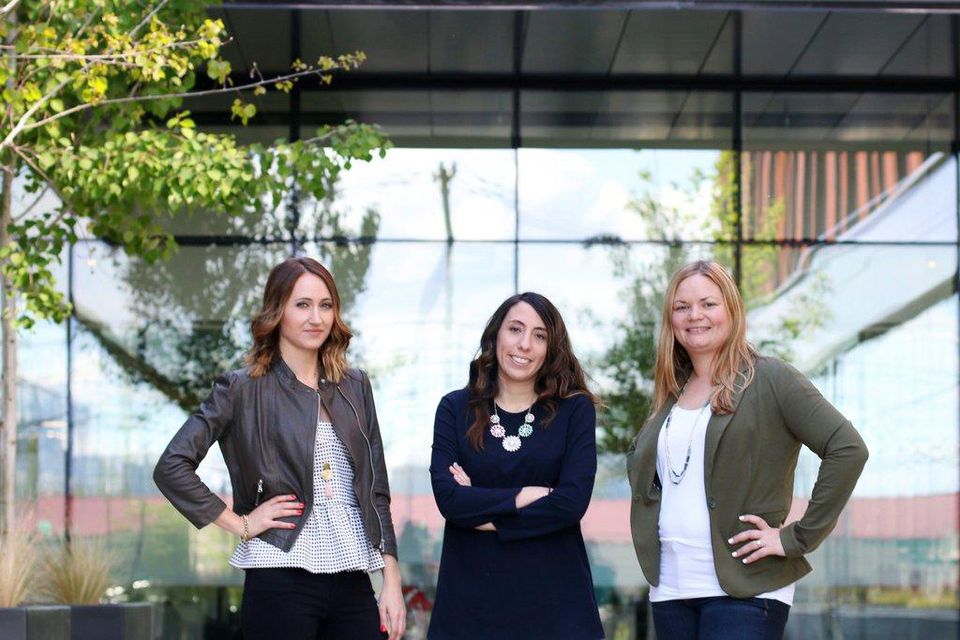Working in the male-dominated tech industry motivated three Amazon colleagues to create an engaging and effective way for women and men to discuss sexism, gender stereotypes and values from a female perspective.
“We were at a happy hour one evening talking about how we felt alone and isolated as women the further we advanced in our careers and brainstormed how we could dispel the societal myth that we need to ‘have it all,'” MaryBeth Pecha recalls, “We always felt better the next day after an evening laughing, venting and supporting each other, so we thought, ‘Why not transform this experience into a game?'”
Pecha, Amber Hanson and Kathryn Ekloff designed Persist the Game, a card game that is a catalyst for a conversation about some of the experiences women face in their careers, personal lives, relationships and health.

How did you come up with the name?
Hanson: Picking a name for your company or product is tough! We ran through a bunch of options, but when we came upon Persist the Game, we immediately knew it was perfect. The definition of persist is, “Continue firmly or obstinately in an opinion or course of action in spite of difficulty, opposition, or failure.” It accurately represents the objective this game has of helping drive inspiration in spite of daily obstacles faced by all women. It also fits nicely with one of our favorite phrases, “Nevertheless, she persisted.”
How did you create Persist The Game? Please walk me through the product development process!
Pecha: To begin, we had no idea what we were doing! We googled non-stop and just started meeting and brainstorming ideas, many of which were very bad. Once we had a promising concept, we booked a weekend at one of our favorite Seattle hotels and started sketching out cards and playing with the strategy.
Coming from Amazon has taught us the importance of testing quickly and iterating to make a product shine. We booked dozens of beta games, gathered feedback and tweaked the content and strategy until we had something that was solid. Once we had the strategy locked, we focused on developing great content for the cards and the overall design and packaging.
Creating the card content was also iterative. We booked a second weekend off-site to judge the quality of the cards and fine-tune the wording. We found that the hardest part of coming up with a new idea is just taking that first step, then momentum takes over.
You say that the game can break down the ‘echo chambers’ on topics like feminism. What do you mean?
Pecha: When we created Persist, we didn’t have a male audience in mind. However, we set up our initial beta games and thought, “Why not bring men to this party?” We discovered that it worked really well to spark discussion in a fun, non-threatening way that actually led to empathy and learning.
I believe the reason this works is that entertainment is an effective medium for change. I think men are tired of being lectured at and feeling chastised. And this approach doesn’t help anyone move forward. But when you fold these themes into a game with humor, it defuses walls that we each put up. It gives everyone an equal seat at the table in a very low-stakes, engaging way.
What advice do you have for other women who hope to start their own businesses?
Pecha: Find other female entrepreneurs. Immerse yourself in their stories. Read their books, their podcasts and their articles and engage in real life. I was amazed by the richness of this community. I was never planning on stepping into entrepreneurship and quickly found it’s a difficult path to pursue once you reach a certain level of security in corporate America. Seeing these stories helps me stay focused on what’s possible, thinking beyond my day job. But I think this concept holds true regardless of your current situation because it helps you find the right mindset. I think it’s imperative to find something that aligns with your values and to do something for impact over personal reward. Also, you have to be stubborn on your vision, have thick skin and get creative when you think you’re hearing “no.”
Kathryn Ekloff: Don’t be afraid of the side hustle. I’m very risk-averse, so quitting my job to start a business was something that was never going to work for me. But dipping my toes into entrepreneurship with Persist, while still maintaining a steady paycheck from my 9-5 at Google has been the perfect mix.
Hanson: Go for it! Don’t wait for the right time, if you do, time is just going to pass you by.
What are some of the benefits of having cofounders?
Pecha: Entrepreneurship can be a lonely journey. It’s so refreshing to have two other people who understand the peaks and valleys on a deeper level than anyone else. It also teaches you how to influence. You have to learn how to deal with conflict resolution, transparency and honesty on an entirely new level.
In Persist, we are also able to leverage each other’s individual strengths, making us stronger as a unit. There’s a reason why several investors will only back partnerships. It demonstrates your ability to compromise and collaborate, a skill you will need with your suppliers, partners and employees. It’s also helpful to spread capital infusion in three ways.
What was a time that you each had to persist?
Pecha: When I started at Amazon, I had a severe case of imposter syndrome and anxiety. I was going through a career transition from accounting to finance, coupled with the steep learning curve of working at Amazon. I let fear take over. I would sit in meetings where I just hoped I didn’t have to speak. I spent a lot of nights in tears after work and was on the verge of quitting several times. But each morning I got up and forced myself to push through the discomfort. It took months to finally find my confidence again. I’m so grateful I pushed through that discomfort because it led to step-change career growth, and I get to work with incredible people.
Ekloff: Giving birth — just kidding, although that was a painful experience to recover from. But in all seriousness, I would probably say dealing with a spouse with a chronic illness. My husband, Joey, has Crohn’s disease and has been hospitalized various time during our eight years of marriage. It’s really difficult to balance that type of personal issue with a demanding career. I didn’t want to let my work suffer, but I’ve definitely come to the realization that there are more important things than work. Being there for my family takes priority.
Hanson: During the first year of my career, while I was learning how to navigate the complexities of a large company gig, my father was diagnosed with brain cancer. With my extremely competitive nature, I was not willing to let my work slip in comparison to my peers. But at the same time, I was emotionally broken. I persisted ‘balancing’ both my new job and dealing with the ugly realities of cancer. The battle ultimately ended a mere year into the fight. I was left with realizing I made mistakes in choosing the wrong priorities. However, I am grateful that this experience taught me lessons on how to persist in life. Life can be short. Do what you want today. Be aware and supportive of the multiple priorities people are trying to balance. Don’t wait too long to go home.
What’s the biggest lesson you learned at work and how did you learn it?
Pecha: It was a mistake to leave my first job after college out of frustration instead of excitement for my next opportunity. I don’t think I realized it was a mistake until a few years later when I was able to reflect on my time in that role. It was clear in hindsight that I didn’t take an opportunity that pushed me to grow and learn as fast as I was capable. I chose comfort over courage, which was a mistake.
Ekloff: Know your worth and don’t be afraid to ask for it. I’m a terrible salary negotiator. It wasn’t until I started talking with other coworkers that I realized how far behind I was in terms of pay — like really, really far behind. I wish I would have understood earlier because it’s a hard hole to dig yourself out of.
Hanson: The biggest lesson I’ve learned from work is actually based on this entrepreneurial journey. Starting your own business means you always have your own voice and it requires you to demonstrate your ability to make decisions and adapt. The lessons from this experience have benefited my day job in a productive way, as I am now more confident in sharing my point of view in any forum and I am even more decisive.
What is one thing that you wish you had known when you were starting out your career?
Pecha: I wish I would have known it’s okay to take risks, experiment and fail. I think as women, we’re so concerned with checking all the boxes, being prepared and not ruffling feathers. I’m generalizing, but this is how most of us were conditioned from an early age. I wish I would have been more curious to try new things, and that I would have gone easier on myself. I wish I had known it’s better to prioritize progress over perfection.
Ekloff: Confidence is one of the most valuable traits you can possess. You can be the smartest person in the room, but unless you sound confident, you will struggle to get your point across.
Hanson: It truly is a journey, not a sprint. Be passionate about what you do. If it sounds like an interesting opportunity, say “yes” without over-analyzing it!
What is the best advice you’ve ever received?
Pecha: I love to read non-fiction books, and this is where I tend to get some of the best advice. I read the book Mindset by Carol Dweck after seeing it on Bill Gates’ blog. This book quite literally changed my life and how I view relationships, work, talent and education. It has made me a perpetual learner and has taught me to embrace challenges and discomfort as growth opportunities. Dweck uses extensive evidence and research to show that it’s not intelligence or ability that are the best predictors of success. It’s approaching life with a growth mindset. I still have an excerpt from the book printed on my wall.
Ekloff: “Be nice.” Everyone has been told that at some point in their life, and it’s actually an incredibly undervalued piece of advice. It may not win you the presidency, but who wants to be president if you don’t have any friends. You’ll lead a much fuller life if you are kind to others.
Hanson: The best advice for me is more about moments than words. Throughout my life, there have been people who have stepped in during pivotal decision points in my journey and have demonstrated confidence in me, especially in cases where I was either insecure or selling myself short. I wouldn’t be where I am today if I hadn’t had people along the way that believed in me. So, the best advice — believe in yourself and surround yourself with people who believe in you and will push you to be your best self.
What is your business advice for other young professional women?
Pecha: Stop being so hard on yourself. I know it feels like you’re trying to study to ace a test each day like you did in college, but perfection is fatal in business. Learn to take risks. Step into spaces that make you feel uncomfortable. Find people you admire to learn from. It doesn’t have to be the vice president. It can be a colleague or someone one level ahead or behind you. If you work hard, there are so many people willing to help you grow. Also, everyone wants to get a mentor. I think you should be a mentor. I’ve learned just as much from my mentees, and it’s important to be generous with your time.
Ekloff: Find a balance. Work is important, but that doesn’t have to define you.
Hanson: No one is going to drive your career for you. You need to have a voice, have an objective and pursue it. Having it all is a myth if you are expecting it all at one time. Prioritize what is important to you and that can change on a daily, weekly or monthly basis. Diversify your experience throughout your career by frequently learning new skills, changing roles or moving cities. It will make you a well-rounded person and leader. Befriend your colleagues, they can become your closest friends and your sanity check. On a personal side, if you chose to find a partner, find one that is supportive of you and your ambitions. It makes chasing your dreams that much easier.
Image via Jordyn Pecha

































2 Responses to Career Profile: MaryBeth Pecha, Amber Hanson, and Kathryn Ekloff, Persist The Game